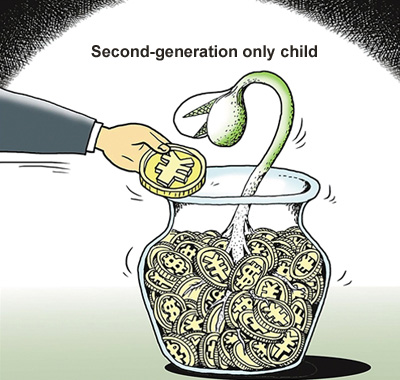|
 |
|
(XINHUA) |
As the first generation born under China's one-child policy in the 1970s, Chen Fang and Wang Qing enjoyed rich and carefree lives in their childhoods. In 2011, this young couple welcomed their daughter Yangyang.
Will Yangyang, a second-generation only child, have a similar childhood as her parents?
What awaits her is an education plan even more intense than what her parents once had.
According to a recent survey made by Beijing Answer Marketing Consulting (BAMC), China's second generation of singletons no longer enjoy childhoods as "little emperors" like their parents. They are richer in material possessions but are exposed to more types of education at earlier ages.
BAMC, founded in 2006, is China's first company engaging in youth market investigation and research. In July 25, the company released the report of the survey on the living conditions and consumption patterns of China's second one-child generation.
They have collected data from 2,787 urban children under 16 years old in 10 cities, namely Beijing, Shanghai, Guangzhou, Chengdu, Shenyang, Wuhan, Xi'an, Hangzhou, Qingdao and Jincheng.
Pre-school education
The second one-child generation starts to study in their infancy, far earlier than their parents whose formal education generally started in primary schools.
According to the survey, nearly 30 percent children under 3 years old are attending kindergarten.
Chen and Wang, both having master's degrees, sent their daughter to a kindergarten when she turned 1 year old.
"I understand that a good education does not necessarily guarantee a bright future, but still I will invest more in my daughter's education and personal development," said Wang while watching her daughter attend an English class.
This is an emotional ambivalence, said a researcher of BAMC. As the "post-1980s" parents have higher educational degrees themselves, they can't help but to set higher standards for their own children and send them to classes at an earlier age.
Apart from kindergartens, parent-child education agencies also rise as a notable part in the pre-K market. More than 20 percent of the children under 3 years old are taking courses of parent-child education.
As the survey shows, the average annual cost of kindergarten is 7,474 yuan ($1,220) and the annual cost for additional tutoring is 4,073 yuan ($664).
Exposure to the Internet
The Internet has become an indispensable tool during pre-K learning process as kids are spending more time online than their previous generation. Children under 7 years old surf the Internet for 58 minutes a day on average and children over 7 years old surf for two hours a day on weekends.
Among all the children investigated, over 76 percent use the Internet frequently. Half of the 4- to 6-year-old kids have access to the Internet and for children from 13 to 16, the rate is 93.2 percent.
As is shown by the survey, children get online mainly to play games. Other options include chatting on instant messengers like QQ, searching for learning materials, watching cartoons and blogging. Over 25 percent of the children surveyed have micro-blog accounts.
The most frequently used electronic devices for children over 7 years old include cellphone, point reading and learning machines, iPad, iPod and PSP.
Holiday courses
A great number of children are taking courses during holidays. Some parents even start to fear that their kids will fall behind if they don't attend extra lessons.
The survey showed that half children take training courses in summer holidays and two out of five kids go to training centers in winter holidays.
Training centers offer a broad range of courses, including dancing, taekwondo, swimming, singing, and instrument playing.
The most popular courses among children are English, arts and crafts and dancing, followed by math training, writing, instrument playing and taekwondo. School subjects' tutorials and training courses of acting and hosting, badminton, table tennis and skateboarding are favored in the third place and lessons like chess playing, basketball, football and robot science are also favored.
When asked about their short-term plans, more than half of the children expressed their hopes for higher scores in exams and over 10 percent of them said they wanted to be free from attending classes.
"Parents have literally passed pressure of competition on to their own children. This is something worth thinking of both for the parents and for society," said a researcher with BAMC.
(Source: China Youth Daily) | 